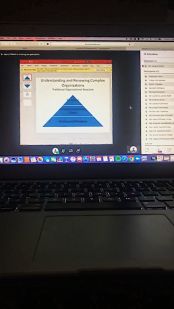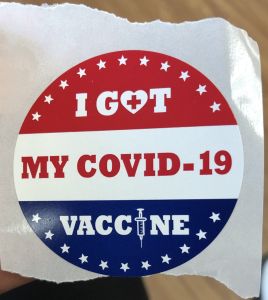It has been a year since the World Health Organization declared the COVID-19 pandemic.

Throughout the year, many places have struggled, and that includes schools. When the lockdown took place, there was a domino effect of college’s changing to remote learning. On March 30, President Donald Taylor sent an email that stated March 23 was the anniversary of Cabrini’s first day of all-virtual instruction. As the United States enters its second year of the COVID-19 pandemic, colleges are becoming hybrid, and COVID-19 vaccines are being given to people.
Many colleges and universities are planning their fall ‘21 semester to look different. “I know we’ll never get back to normal,” Tommy Thompson, president of the University of Wisconsin, told the Associated Press. “I know that. But I’m going to fight like hell to get back as close to normal as we possibly can. With testing, with vaccinations, with having our classes open, our dorms open, hopefully, we’ll be playing sports, having a good time once again.”
On March 25, Rutgers University announced that students would be required to be vaccinated before returning to campus in the fall. This comes after President Biden vowed that there will be enough vaccines for every adult in America by the end of May. However, Rutgers stated that students can request to be exempt from this requirement for religious or medical reasons. The Rutgers announcement said, “The university has received approval by the State of New Jersey to administer vaccines on campus to faculty, staff and students once vaccine supplies are available to the university.”
Some students agree with Rutgers University’s vaccine requirement for the fall semester. “I think it’s a good idea,” Paige Marquez, senior psychology major, said. “It can help all on-campus students to be safe and try to get things back to how it was before the pandemic.”
Taylor’s email said that Cabrini is planning a primarily in-person course modality for the fall ‘21 semester. He is also expecting operations to resume with a more traditional on-campus schedule, including student life and residence halls.
“My hope is for our students to choose the modality that best fits their learning style while also offering the safest campus environment for learning,” Stephen Rupprecht, dean of students, said in a email interview.
According to Dr. Chioma Ugochukwu, provost and vice president for academic affairs, said in an email interview, Cabrini will be offering 267 in-person lectures and 47 hybrid undergraduate classes, while also offering 79 online undergraduate sections. However, it should be noted that some changes might still be made between now and the first day of classes in the fall.

“My hope is that we are fully back to our regular teaching schedules,” Ugochukwu said. “Our fall distribution of modalities reflects this hope since we have scheduled mostly face-to-face class sections. However, we are also ready to make the appropriate adjustments if safety concerns remain.”
When asked if there would still be a six-foot requirement, Ugochukwu stated it was still being determined. She also noted that the administration is still having conversations about which protocols should stay the same and which could be relaxed. It all depends if COVID-19 rates increase or decrease.
“We are hoping that the high rate of vaccinations will have a positive impact on fall classes,” Ugochukwu said. “However, we will continue to put appropriate measures in place to ensure a safe environment for all our students, faculty, and staff.”


